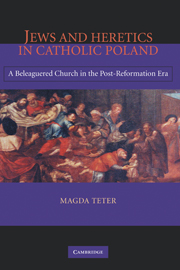Book contents
- Frontmatter
- Contents
- List of Illustrations
- Preface and Acknowledgments
- Note on Terms, Spelling, and Translations
- Abbreviations
- JEWS AND HERETICS IN CATHOLIC POLAND
- Introduction
- 1 “One Mystical Body … Only One Shepherd”: The Church Ideals of Social Order
- 2 The Upset Social Order: Nobles and the Jews in Poland
- 3 Heresy and the Fleeting “Triumph of the Counter-Reformation”
- 4 “Bad and Cruel Catholics”: Christian Sins and Social Intimacies Between Jews and Christians
- 5 “A Shameful Offence”: The Nobles and Their Jews
- 6 “Countless Books Against Common Faith”: Catholic Insularity and Anti-Jewish Polemic
- 7 “Warding Off Heretical Depravity”: “Whom Does the Catholic Church Reject, Condemn and Curse?”
- Conclusion: Did the Counter-Reformation Triumph in Poland?
- Glossary
- Notes
- Selected Bibliography
- Index
Conclusion: Did the Counter-Reformation Triumph in Poland?
Published online by Cambridge University Press: 12 January 2010
- Frontmatter
- Contents
- List of Illustrations
- Preface and Acknowledgments
- Note on Terms, Spelling, and Translations
- Abbreviations
- JEWS AND HERETICS IN CATHOLIC POLAND
- Introduction
- 1 “One Mystical Body … Only One Shepherd”: The Church Ideals of Social Order
- 2 The Upset Social Order: Nobles and the Jews in Poland
- 3 Heresy and the Fleeting “Triumph of the Counter-Reformation”
- 4 “Bad and Cruel Catholics”: Christian Sins and Social Intimacies Between Jews and Christians
- 5 “A Shameful Offence”: The Nobles and Their Jews
- 6 “Countless Books Against Common Faith”: Catholic Insularity and Anti-Jewish Polemic
- 7 “Warding Off Heretical Depravity”: “Whom Does the Catholic Church Reject, Condemn and Curse?”
- Conclusion: Did the Counter-Reformation Triumph in Poland?
- Glossary
- Notes
- Selected Bibliography
- Index
Summary
Generations of historians from the early twentieth century to the present have agreed on the common view that the Counter-Reformation triumphed in Poland. If there has been a debate about these matters, it has usually been limited to the timing. Did the Counter-Reformation triumph before or after mid-seventeenth century, when wars with non-Catholic neighbors plagued Poland-Lithuania and the anti-Trinitarians were expelled? A number of events and trends have been cited as evidence: the decline of the number of Protestants in Poland, including the decline in their Senate representation, in students of Protestant schools, in church membership and number of churches, and in the number of Protestant books published. Also taken as evidence of the Catholic triumph were the 1658 expulsion of the anti-Trinitarians, who dispersed throughout Western and Central Europe, and the anti-Protestant laws – peaking in the first half of the eighteenth century – that prohibited the building of new Protestant churches and restricted political rights by banning Protestants from political posts. Scholars of culture have pointed also to the increased number of new Catholic churches built in the baroque era and to the dominance of Catholic devotional works in the numbers of books published in Poland after the end of the sixteenth century.
This view of the “triumph of the Counter-Reformation” has been accepted both by the Catholic historians who cherished the “victory of Catholicism” and by historians who saw the period between the end of the sixteenth century and the end of the eighteenth century as a period of dark ages between the brightness of the Renaissance and the Enlightenment.
- Type
- Chapter
- Information
- Jews and Heretics in Catholic PolandA Beleaguered Church in the Post-Reformation Era, pp. 142 - 146Publisher: Cambridge University PressPrint publication year: 2005



